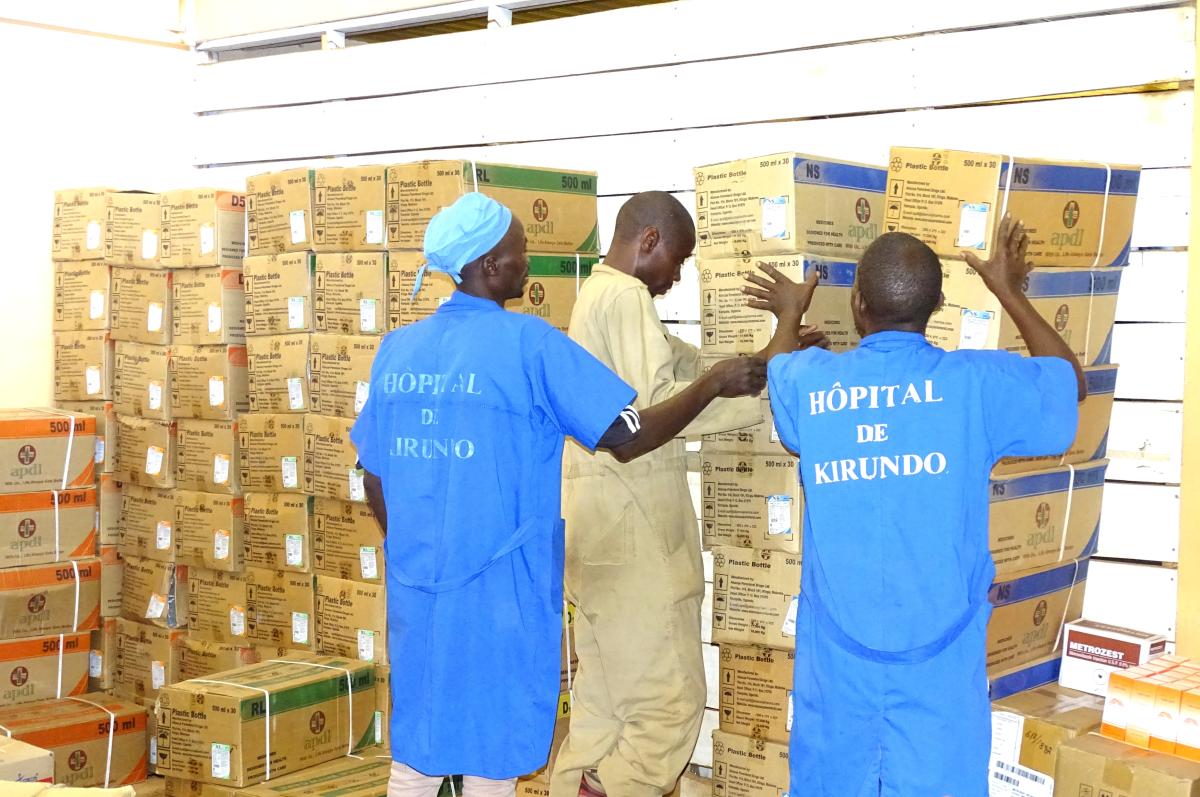Search
Viewing 30 to 45 of 3126 news
-
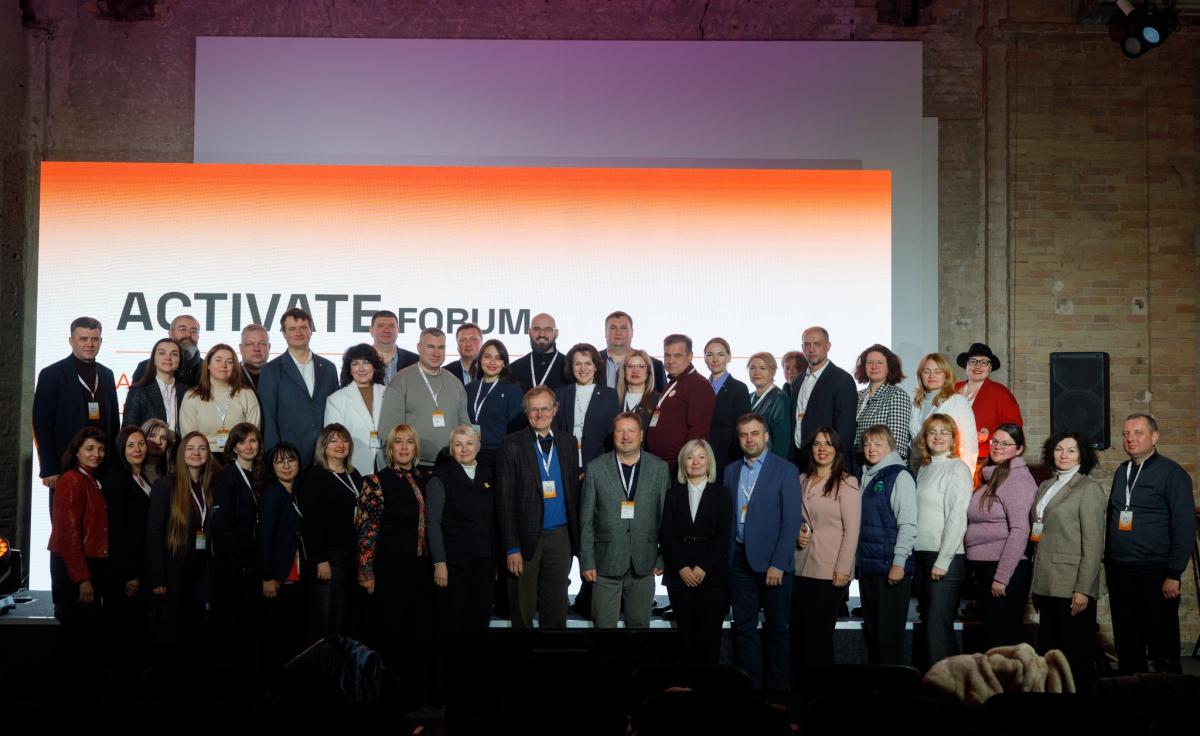
Ukraine: Enabel hosts an event on active labour market policies
Taisiia DRUZIUK | 21/01/2026
On 15 January, Enabel hosted the ACTIVATE Forum, an event on active labour market policies and pathways to their implementation. The forum brought together partners to mark the completion of the first phase of our ALMP Facility grant programme and the launch of its second call, Jobs for the Future. The event featured remarks from Luc Jacobs, Ambassador of Belgium to Ukraine; Daria Marchak, Deputy Minister of Economy, Environment and Agriculture of Ukraine; and Henrik Huitfeldt, Head of Section for Public Finance, Business Support, and Social Policies at the EU Delegation to Ukraine.Regional economic strategy perspectives were presented by Zhanna Osypenko, Deputy Head of the Kyiv Regional Military Administration, and Zhanna Sherstiuk, Deputy Head of the Chernihiv Regional Military Administration. Dirk Deprez, Enabel Country Director: "Active labour market policies are not just about economic indicators – they are first and foremost about people. Helping people find jobs, return to the labour market, or gain new skills is essential for sustainable recovery." Nine finalists of Enabel's ALMP Facility grant programme presented projects aimed at activating the labour markets in the Chernihiv and Kyiv regions. Career support for veterans, short-term training courses in the construction sector, and training for electricians restoring critical infrastructure – these and other initiatives will soon be implemented with Belgium’s support. Oleksandra Borodiyenko, Enabel expert: "The finalists demonstrated a deep understanding of the dynamics of regional labour markets and within specific communities. All selected projects offer a comprehensive approach to supporting people – from training or retraining to employment with partner companies."
-
Burundi : mieux soigner grâce à un accès renforcé aux médicaments de qualité
Jean BIRONKWA | 20/01/2026
Le Programme AMAGARA MU MURYANGOappuie l'ABREMA pour un meilleur accès aux médicaments de qualité.La qualité et l'accessibilité des produits pharmaceutiques en santé constituent un des piliers essentiels pour garantir des soins de santé efficaces et équitables à la population. Au Burundi, ce secteur stratégique fait face à plusieurs défis, notamment en matière de gestion logistique, de disponibilité des données et de régulation des médicaments. Enabel, à travers le Programme d'appui au système de santé (UE-PASS FBP 3) « AMAGARA MU MURYANGO » financé par l'Union européenne, apporte un appui stratégique et technique à l'ABREMA (Autorité burundaise de régulation des médicaments à usage humain et des aliments), afin de renforcer la gouvernance et l'efficacité du secteur pharmaceutique du pays. La gestion des médicaments au Burundi souffre notamment d'une insuffisance de centralisation et d'harmonisation des données d'information logistique à tous les niveaux du système de santé. Cette situation complique l'identification rapide des médicaments les plus essentiels, l'anticipation des besoins entraînant ainsi des ruptures fréquentes de stocks au détriment des patients. Pour répondre à ces défis, l'appui du UE-PASS FBP3 à l'ABREMA s'est articulé autour de plusieurs actions concrètes. Un total de 357 gestionnaires de pharmacie issus de 15 districts sanitaires, ont notamment d'une formation axée sur le Système de Gestion et d'Information Logistique (SGIL). Cette initiative visait à renforcer leurs capacités et à préparer l'introduction prochaine de l'eLMIS Medexis, un logiciel moderne de gestion électronique des médicaments. L'adoption de cet outil représente une avancée majeure vers une meilleure traçabilité, une planification plus efficace et une optimisation durable des stocks. Le Programme AMAGARA MU MURYANGO a également accompagné l'ABREMA dans la validation des documents stratégiques, notamment la finalisation des textes réglementaires relatifs à l'assurance qualité des produits de santé. Par ailleurs, un Manuel de procédures administratives, financières et comptables a été validé. Ce document constitue un levier fondamental pour instaurer une gouvernance institutionnelle transparente, efficace et conforme aux normes de bonne gestion au sein de l'ABREMA. En complément, un appui matériel substantiel a été apporté, notamment l'acquisition d'équipements informatiques modernes. Ce soutien logistique contribue à renforcer les capacités opérationnelles de l'ABREMA et à améliorer son rôle de régulation du secteur pharmaceutique.
-
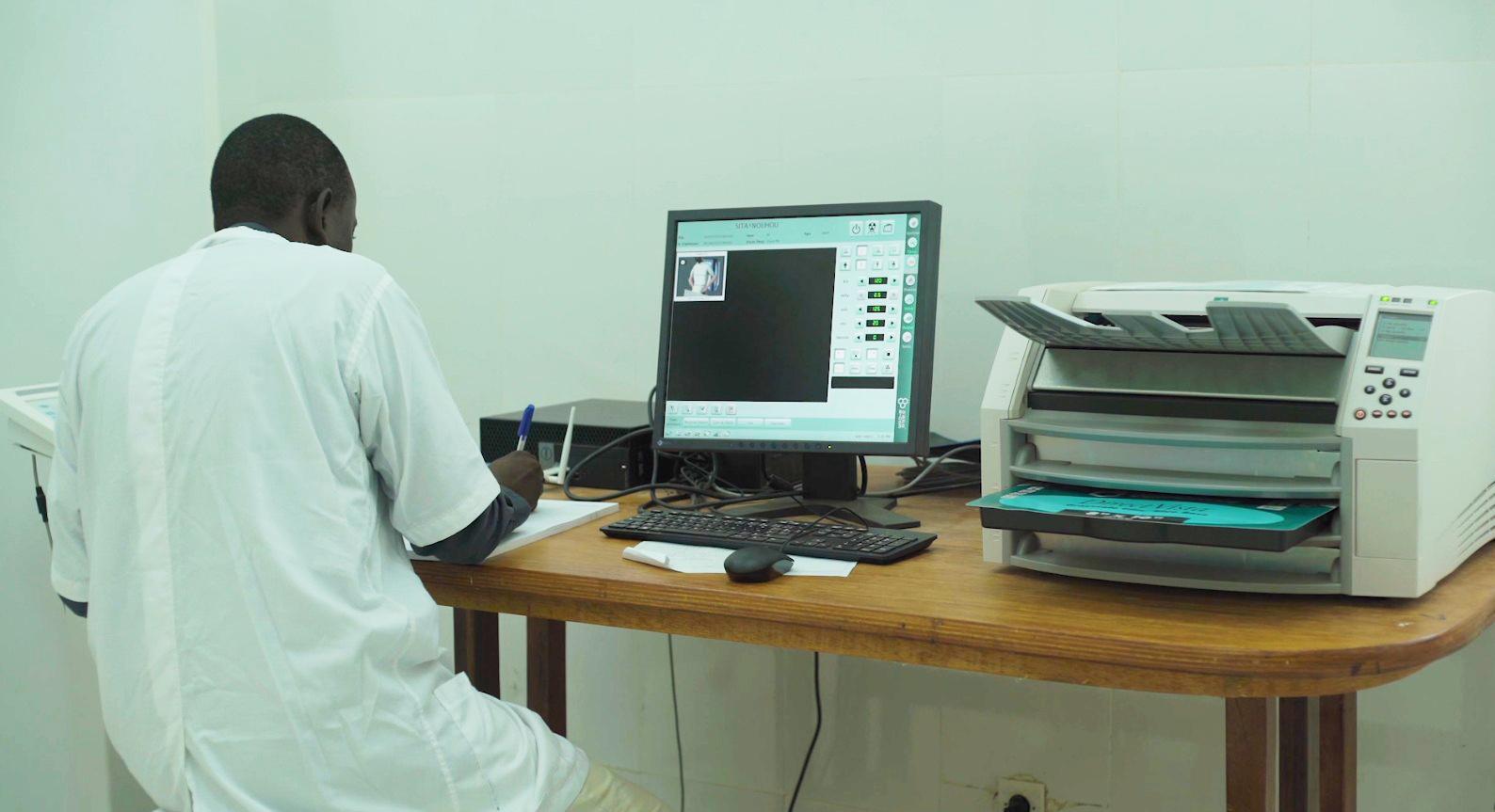
La digitalisation des hôpitaux améliore les soins au Niger
Halissa HASSAN DAN AZOUMI | 20/01/2026
Ce jeudi 15 janvier 2026, un atelier de capitalisation sur le système d’information hospitalier (SIH) s’est tenu à Niamey. Cette rencontre s’inscrivait dans le cadre du projet d’Appui au Système de Santé PASS Sutura, financé par la Belgique et mis en œuvre par Enabel, ainsi que du projet de lutte contre le paludisme (Paludisme GF), financé par la Fondation Gates et également exécuté par Enabel. L’atelier a réuni l’ensemble des parties prenantes impliquées dans la mise en œuvre des projets, notamment les équipes d’Enabel, les représentants du niveau central du système de santé, ainsi que les responsables des hôpitaux et des Centres de Santé Intégrés (CSI).La mise en place du Système d’Information Hospitalier OpenClinic GA dans plusieurs formations sanitaires marque une avancée importante pour le système de santé. Appuyée par Enabel et ses partenaires, cette initiative vise à améliorer la gestion des hôpitaux, le suivi des patients et la qualité des soins.Déployé dans dix hôpitaux et centres de santé à Gaya, Gothèye, Dosso, Doutchi, Boboye et Dioundiou, le système permet de centraliser les dossiers des patients, la facturation, la pharmacie, le laboratoire et les statistiques sanitaires. Les agents de santé disposent ainsi d’informations fiables, accessibles et mieux organisées.Grâce à la digitalisation et à l’installation d’équipements durables (énergie solaire, réseaux informatiques, assistance à distance), les résultats sont déjà visibles. Les responsables des formations sanitaires indiquent une hausse significative des recettes, parfois multipliées par deux à quatre, ainsi qu’une meilleure traçabilité des soins et des prestations.En capitalisant sur ces résultats encourageants, l’expérience du SIH démontre que la santé numérique constitue une solution pertinente et adaptée au contexte nigérien. Elle ouvre ainsi des perspectives prometteuses pour une extension progressive du système à l’échelle nationale, au service d’un système de santé plus performant, transparent et centré sur les patients.
-
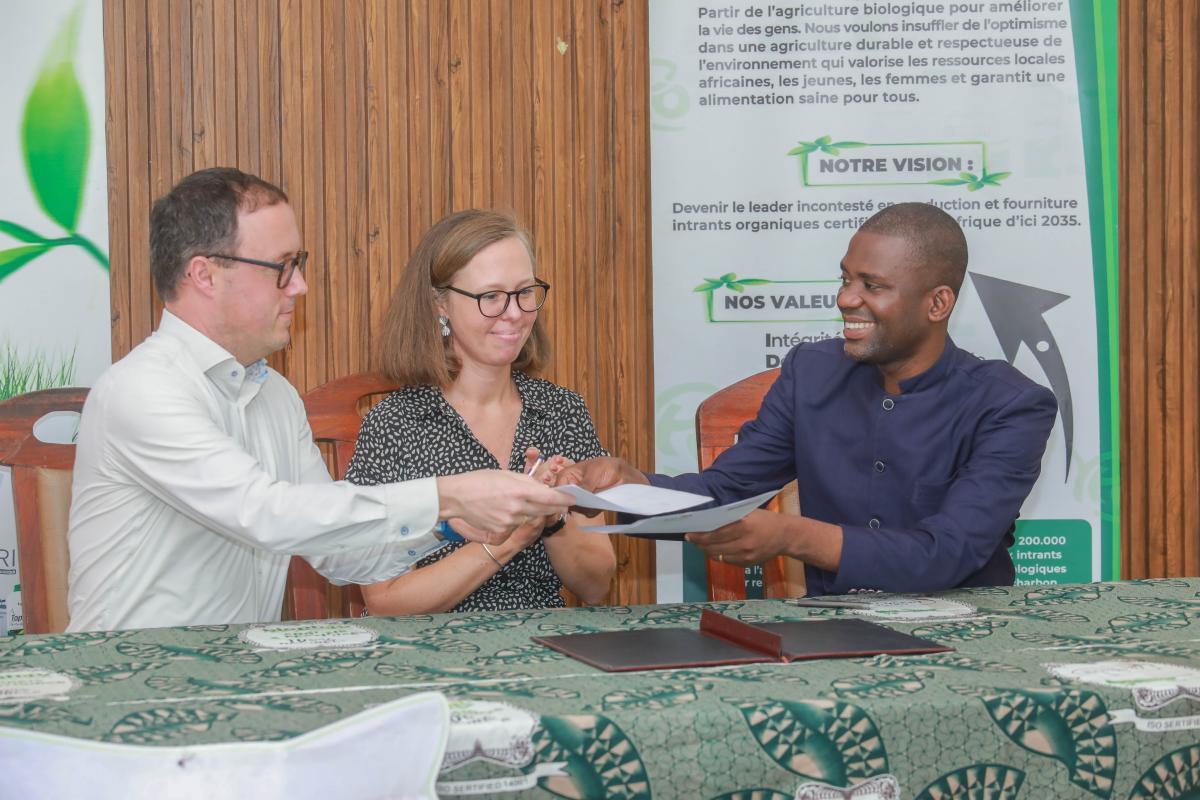
BIOPHYTO : quand l'accompagnement patient crée un champion régional
Reece-hermine ADANWENON | 16/01/2026
15 janvier 2026 à Cotonou, l'émotion était palpable dans la salle de réunion de Biophyto à Allada. Le Dr Gildas Zodomey, fondateur de BIOPHYTO, peinait à retenir ses larmes en signant l'accord de financement de 2,75 millions d'euros avec BIO Invest. Après des années de combat, de doutes et de persévérance, son entreprise franchit un cap historique qui la propulse au rang de champion régional des intrants agricoles biologiques. Un parcours entrepreneurial hors du commun Créée en 2013, BIOPHYTO s'est imposée comme la seule entreprise béninoise à produire et commercialiser des biopesticides certifiés et des engrais organiques. Dans un secteur dominé par les intrants chimiques importés, le pari du Dr Zodomey était audacieux : prouver qu'une agriculture durable, respectueuse de la santé humaine et des écosystèmes, était non seulement possible mais aussi économiquement viable. Les chiffres parlent d'eux-mêmes : un chiffre d'affaires passé de 216 millions FCFA en 2020 à plus de 2 milliards FCFA en 2025, soit une croissance multipliée par 10 en cinq ans. L'accompagnement Enabel : un parcours sur mesure depuis 2019 Derrière cette success story se cache un accompagnement patient, structuré et adapté aux besoins de l'entreprise. Depuis 2019, Enabel au Bénin, à travers son programme de coopération en appui au secteur agricole, a mis en place un dispositif d'appui combinant une diversité d'instruments financiers et techniques. Phase 1 : Structuration et renforcement des capacités (2019-2022): l'accompagnement a débuté par une immersion dans les meilleures pratiques internationales, avec deux voyages d'échange au Ghana pour s'approprier la technique de production du charbon actif enrichi à l'éthylène. Parallèlement, Enabel a travaillé avec BIOPHYTO sur : la mise à jour du plan d'affaires, l'éducation financière et le conseil fiscal, la facilitation d'un crédit fonds de roulement de 20 millions FCFA auprès d'une institution de microfinance partenaire, la mise en place d'une subvention de 46 millions FCFA, adossée à un crédit bancaire de 226 millions FCFA, garanti partiellement par le Fonds National de Développement Agricole (FNDA). Cette première phase a permis à BIOPHYTO de consolider ses fondamentaux et d'améliorer significativement sa performance opérationnelle et commerciale. Phase 2 : Consolidation et transformation (2023-2024) : une fois les capacités suffisamment renforcées, Enabel a accompagné la structuration d'un dossier auprès du fonds belge Kampani pour l'obtention d'un prêt subordonné de 500 000 EUR (328 millions FCFA). Cette étape cruciale a nécessité : la certification des comptes de l'entreprise, la transformation juridique de SARL à SA, le renforcement de la gouvernance d'entreprise. Ce financement a permis à BIOPHYTO d'accroître davantage ses capacités de production et de gagner en crédibilité auprès du secteur financier national et international. Phase 3 : Scaling et expansion régionale (2025-2026) : fort de ces acquis, BIOPHYTO était désormais prêt pour une levée de fonds significative. En 2025, Enabel a facilité la mise en relation avec BIO Invest, aboutissant à la signature, le 15 janvier 2026, d'un accord de financement de 2,75 millions EUR (près de 2 milliards de Fcfa ). Un financement transformateur pour l'avenir Cet investissement permettra à BIOPHYTO de : augmenter massivement sa capacité de production : atteindre 700 000 litres de biopesticides et 5 000 tonnes d'engrais/compost par an s'implanter en Côte d'Ivoire avec une nouvelle unité de production moderniser ses équipements avec intégration de l'énergie solaire créer des emplois et renforcer les partenariats avec les petits producteurs, dont une majorité de femmes La force du modèle Team Belgium Comme le souligne Joris Totté, CEO de BIO Invest : "Ce partenariat s'inscrit dans un continuum belge déjà à l'œuvre. En alignant investisseurs d'impact, ONG et Enabel autour d'objectifs et d'outils complémentaires, nous démultiplions l'impact et sécurisons la montée en puissance d'entreprises transformantes." Cette approche coordonnée entre acteurs belges à savoir Enabel, BIO Invest, Kampani, et l'Ambassade de Belgique à Cotonou constitue un modèle d'efficacité dans la coopération au développement. Chaque acteur intervient au moment opportun avec les instruments adaptés, créant un véritable effet de levier. Des témoignages chargés d'émotion Dr Gildas Zodomey, visiblement ému : "C'est grâce à vous que BIOPHYTO est arrivé à ce niveau. À chaque difficulté, vous étiez là. Quand notre moral faiblissait, vous nous redonniez de l'énergie. Vos appuis techniques, financiers, vos conseils stratégiques, vos encouragements nous ont forgés. Aujourd'hui, je peux dire avec fierté que c'est fait. Je peux clamer haut et fort que la coopération bénino-belge fonctionne parce qu'elle évolue, produit de l'impact, sauve des vies, crée des richesses et pense à l'avenir de l'humanité." Olivier Krins, Directeur d'Enabel au Bénin : "Ce succès n'est pas que celui de BIOPHYTO, mais celui du Bénin tout entier. Cela a été possible grâce à la force de la Team Belgium avec un vrai partenariat entre le Bénin et la Belgique. Aujourd'hui, le Bénin peut être fier d'avoir un champion, mais déjà nous rêvons d'en avoir d'autres, de disséminer cette expérience et de susciter d'autres champions dans les années à venir." S.E. Sandrine Platteau, Ambassadrice de Belgique au Bénin : "BIOPHYTO prouve qu'on peut allier performance économique, santé publique et protection des écosystèmes, tout en valorisant le rôle des femmes rurales. Nous sommes fiers d'accompagner cette dynamique au Bénin et dans la région. Au Bénin, notre action va au-delà de l'exécution d'un programme de coopération. C'est une dynamique qui porte l'entrepreneuriat et l'innovation au cœur des actions pour développer des modèles économiques durables." Un impact qui dépasse les chiffres Au-delà de la performance financière, BIOPHYTO crée un impact socio-économique et environnemental significatif : création d'emplois décents tout au long de la chaîne de valeur, autonomisation économique des femmes à travers les partenariats avec les petites productrices, protection de la santé publique en réduisant l'exposition aux pesticides chimiques, préservation des écosystèmes par la promotion d'une agriculture régénératrice, sécurité alimentaire renforcée par des pratiques durables. Perspectives et ambitions régionales Avec ce nouveau financement, BIOPHYTO ambitionne de devenir le partenaire de référence en Afrique de l'Ouest (Côte d'Ivoire, Sénégal, Togo) pour les gouvernements et le secteur privé dans le domaine des intrants agricoles biologiques. Cette expansion régionale permettra de massifier l'impact et de contribuer à la transformation des systèmes agricoles ouest-africains vers plus de durabilité et de résilience. Un modèle à répliquer L'histoire de BIOPHYTO démontre qu'avec un accompagnement adapté, patient et coordonné, les entreprises africaines peuvent devenir des champions régionaux capables de transformer leurs secteurs. Enabel au Bénin s'engage à répliquer ce modèle d'accompagnement avec d'autres entreprises à fort potentiel, contribuant ainsi à bâtir un écosystème entrepreneurial dynamique et durable au Bénin. La cérémonie de signature du 15 janvier 2026, en présence de l'Ambassadrice de Belgique, du Directeur d'Enabel Bénin, du CEO de BIO Invest et de l'Executive Director de Kampani, marque non seulement l'aboutissement d'un parcours, mais le début d'une nouvelle aventure prometteuse pour BIOPHYTO et pour l'agriculture durable en Afrique de l'Ouest.
-
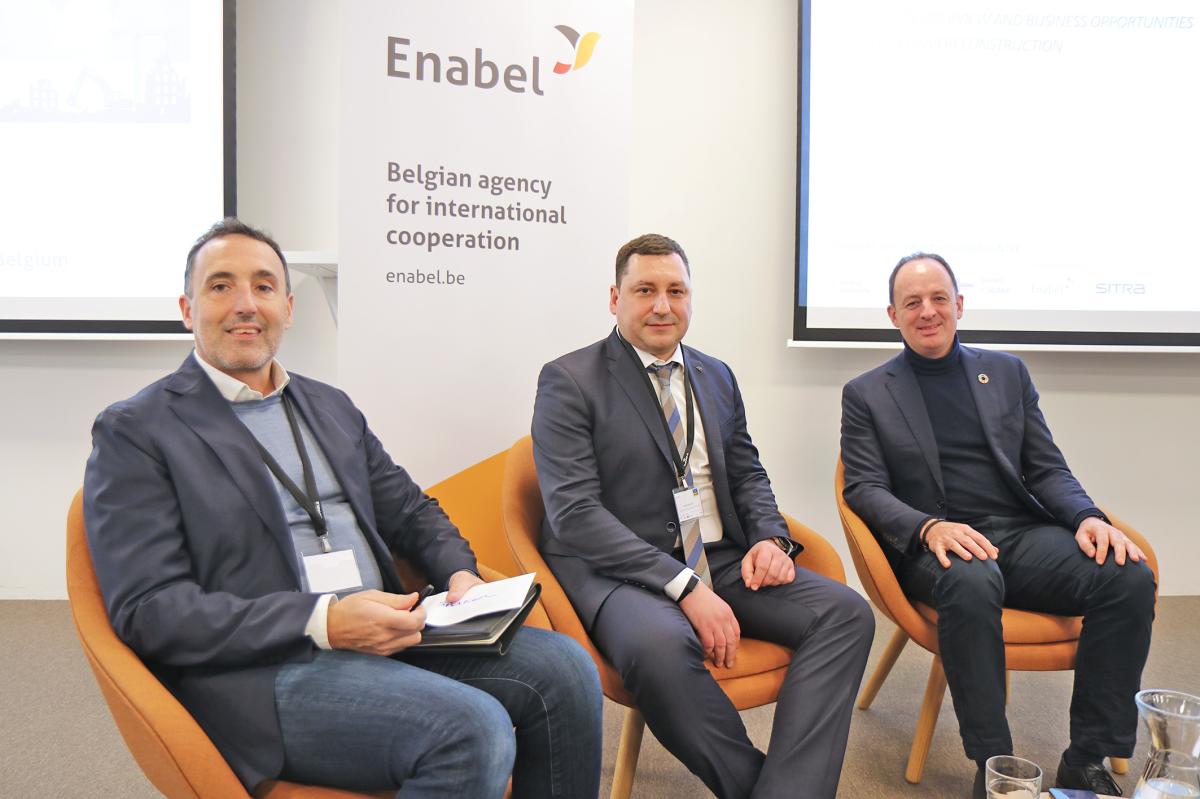
Networking event : Ukraine’s circular recovery and reconstruction
Florence HECQUET | 14/01/2026
War Debris and Hazardous Waste Management in Ukraine: Situation Overview and Business Opportunities for Circular ReconstructionEnabel, through the EU Circular Economy Resource Centre (EU CERC), together with Enabel’s BE-Relieve program in Ukraine and UNEP-Ukraine, organised an exclusive briefing and networking event focused on Ukraine’s circular recovery and reconstruction, with a special emphasis on war debris and hazardous waste management.This event brought together key Ukrainian decision-makers, companies, and sector stakeholders to provide a clear, up-to-date overview of ongoing recovery and reconstruction initiatives, outline current challenges, and highlight emerging business opportunities. The programme will place strong emphasis on interactive discussion, allowing private-sector participants to raise questions, exchange views, and explore concrete, implementable business opportunities.Event and AgendaDate: 22 January 2026Time: 14:00 – 17:00 CETVenue: Enabel Office, Rue Haute 147, BrusselsAgenda:14:00 – 14:30 Opening remarks and introduction Jean Van Wetter, CEO, Enabel Mr. Oleg Bondarenko, Chair of the Parliamentary Committee on Environmental Policy and Nature Management Mr. Ihor Zubovych, Deputy Minister of the Economy, Environment and Agriculture of Ukraine Introductory overview - Pier Carlo Sendei, Senior Programme Officer, UNEP Ukraine 14:30 – 15:15 Presentation "Situation overview and Business Opportunities in War Debris and Hazardous Waste Management for Ukraine’s Circular Reconstruction" Johan de Fraye, Executive Director, Nicole Foundation 15:15 – 16:00 Q&A Session 16:00 – 16 :10 Closing remarks 16 :10 – 17:00 Networking drinksAbout EU CERC EU CERC is a five-year project funded by the European Union and the Ministry of Foreign Affairs of Finland, and implemented by the Sitra, Finnish Innovation Fund and Enabel. The Centre aims to increase the uptake of sound and inclusive circular economy policies and business models, based on peer-to-peer exchanges and partnerships between EU and partner’s country stakeholders. About BE-Relieve BE-Relieve Ukraine is a four-year programme funded by Belgium and implemented by Enabel. It addresses urgent reconstruction needs while fostering long-term systemic change to strengthen Ukraine’s foundation for EU accession. The programme focuses on energy and circular construction, health and social protection, as well as education and employment, contributing to a more resilient and sustainable recovery for the country. About UNEP in Ukraine As the leading global authority on the environment, UNEP brings together international expertise to support Ukraine in responding to war-related environmental emergencies while simultaneously planning for green recovery and sustainable reconstruction.UNEP's work in Ukraine focuses on critical environmental issues including the assessment and management of war debris containing hazardous materials such as asbestos, protection of water resources following the Kakhovka Dam breach, development of resilient and sustainable energy systems, and support for environmental governance frameworks. Join us to connect with Ukrainian leaders, explore strategic opportunities, and contribute to building a sustainable and circular future for Ukraine.
-
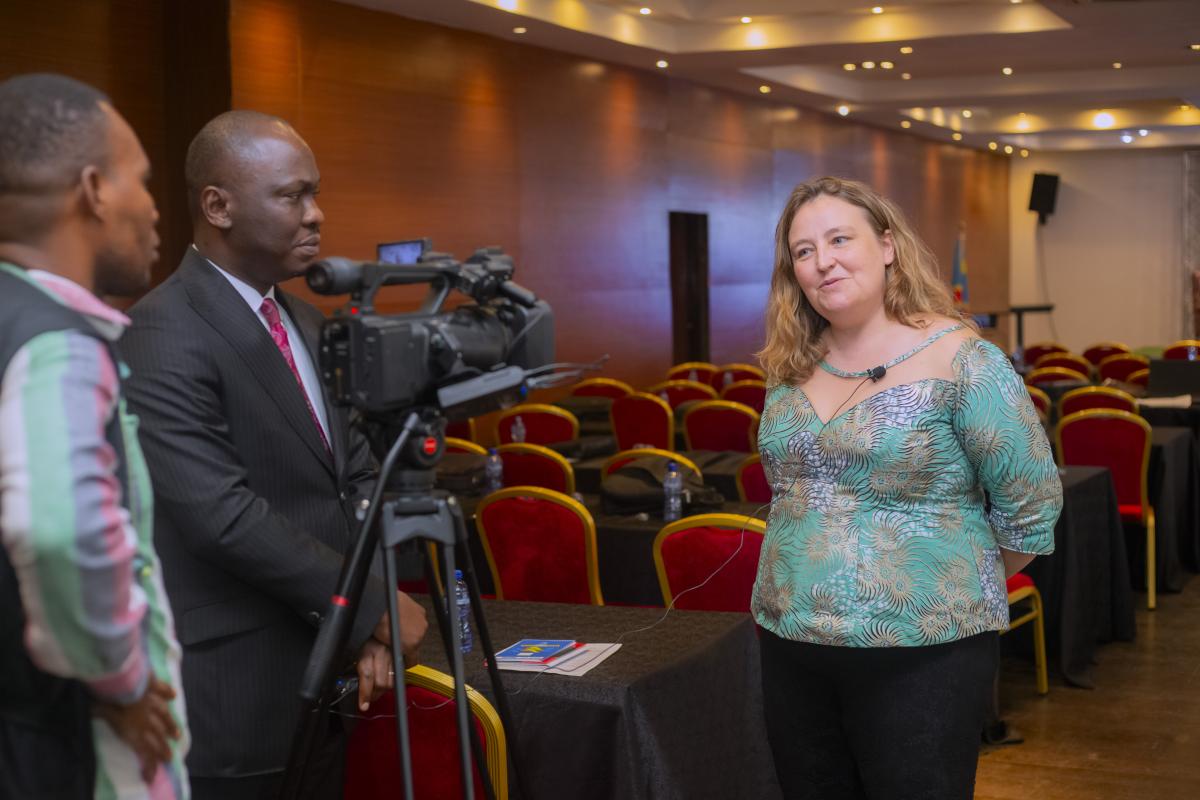
RDC : la formation professionnelle au cœur des réformes pour l’émergence économique
Paola VANGU TSAKALA | 09/01/2026
Une conférence annuelle pour fédérer les acteurs du secteur Le ministère de la Formation professionnelle a lancé le 15 décembre 2025, sa conférence annuelle réunissant les responsables provinciaux et les cadres de l’institution. Cette rencontre visait à présenter les réformes et innovations en cours, à favoriser l’appropriation de la politique sectorielle et à renforcer la collaboration entre les différents acteurs de la formation professionnelle. « Vous êtes ici pour réfléchir à tous ces problèmes. Nous devons bâtir ensemble un ministère de la Formation professionnelle. En un mot, formation professionnelle = préparer quelqu’un à effectuer le travail qui l’attend. Comprendre la formation professionnelle ainsi, c’est corriger les erreurs de l’enseignement pour permettre à quelqu’un de travailler. » S.E. Marc Ekila Likombo, Ministre de la Formation professionnelle et Métiers.Une vision partagée pour des compétences adaptées au marché du travail Pendant cinq jours, les travaux ont permis de consolider une vision commune pour une formation professionnelle efficace, orientée vers l’emploi, la digitalisation et la durabilité. Les échanges ont également renforcé la responsabilisation des acteurs provinciaux dans la mise en œuvre des politiques publiques du secteur. Cette dynamique s’inscrit dans une logique de préparation concrète des compétences requises par le marché du travail, afin de stimuler l’insertion professionnelle des jeunes et de soutenir le développement économique du pays. La formation professionnelle comme levier de transformation économique Pour Katrien Spruyt, Experte en formation professionnelle à Enabel, l’enjeu est clair : « Ce qui est plus important pour le secteur, c’est de se démarquer. Partout dans le monde, la formation professionnelle émerge avec un objectif spécifique : développer des compétences adaptées au monde de l’emploi et devenir un facteur clé de changement économique visible. Ce sont des domaines où de nouveaux types de compétences sont nécessaires, et la formation professionnelle y joue un rôle central. » Un cadre stratégique renforcé par la politique nationale Les travaux ont également permis d’outiller les participants sur les questions liées à la gouvernance, à l’insertion professionnelle et à l’organisation du secteur. Pour rappel, la RDC a adopté en septembre dernier la Politique nationale de la formation professionnelle 2025-2034 (PNFP), un cadre stratégique majeur destiné à dynamiser le secteur et à mieux répondre aux besoins évolutifs du marché de l’emploi.
-
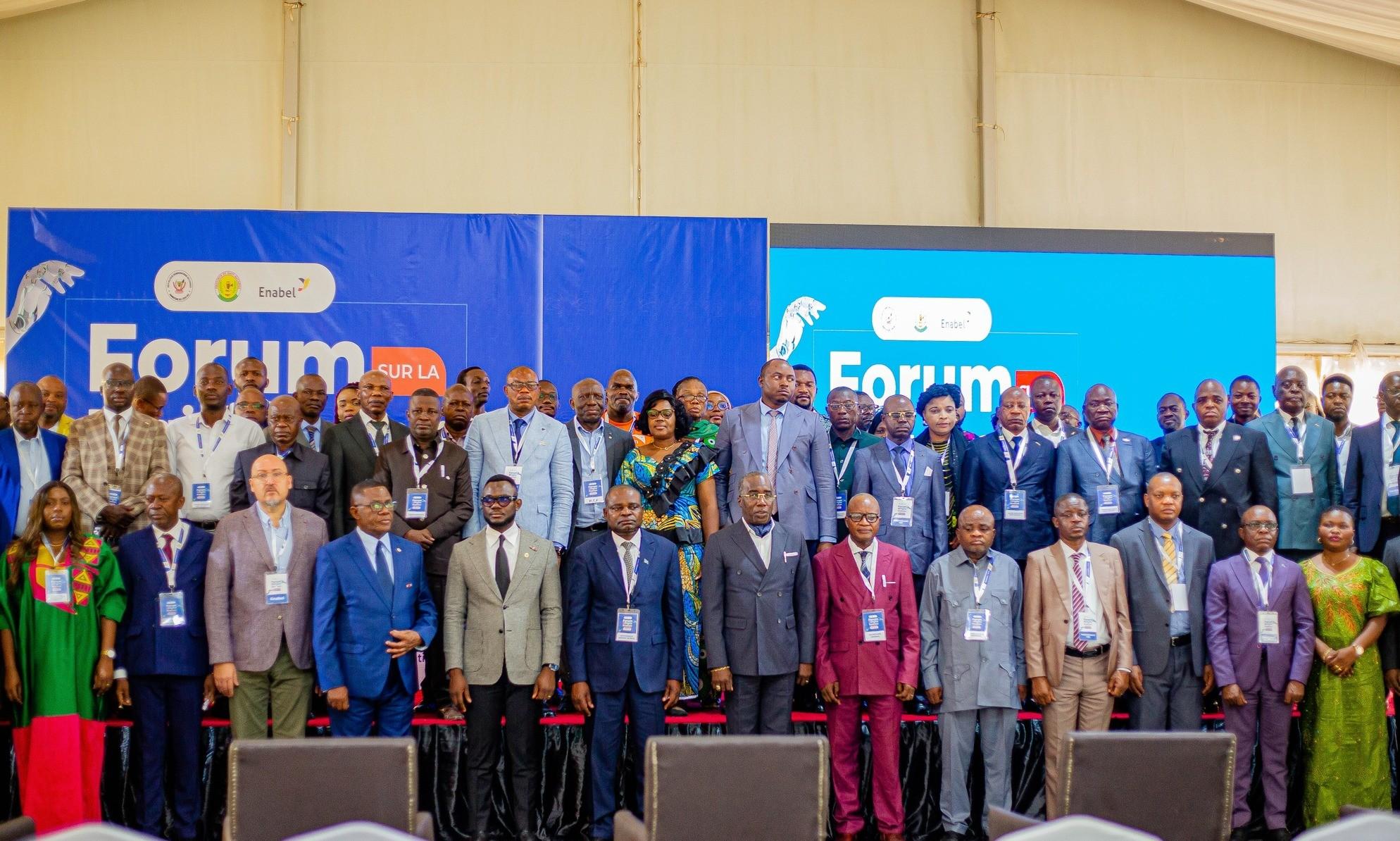
En RDC, l’école passe au numérique
Paola VANGU TSAKALA | 09/01/2026
Digitalisation de l’éducation : Lubumbashi au cœur de la transformation numérique du système éducatif congolais.Un forum stratégique pour accélérer l’intégration des TIC : du 11 au 13 décembre 2025, la ville de Lubumbashi a accueilli un forum consacré à la digitalisation de l’éducation, placé sous le thème : « Le rôle des TIC dans le système éducatif congolais ». Organisé avec la Division provinciale de la province éducationnelle Haut-Katanga 1, avec l’appui du projet Éducation de base (Edubase), cet événement visait à accélérer l’intégration des Technologies de l’Information et de la Communication (TIC) dans le système éducatif national. Représentant la ministre d’État, ministre de l’Éducation nationale et Nouvelle Citoyenneté, Raïssa Malu, le Secrétaire général a.i., Odon Mulanda, a rappelé que cette initiative s’inscrit dans le Plan Quinquennal 2024-2029. Celui-ci ambitionne de moderniser les infrastructures éducatives, de renforcer les compétences des acteurs du secteur et d’améliorer la gouvernance du système éducatif en RDC. Le forum a mis en lumière des avancées majeures, notamment l’utilisation de l’intelligence artificielle dans la correction des examens d’État et l’adoption de la technologie Blockchain pour sécuriser les diplômes. Ces innovations traduisent une transformation en profondeur, visant à rendre le système éducatif plus efficace, plus transparent et mieux adapté aux défis du XXIᵉ siècle. Former pour réussir la transition numérique Ce cadre d’échanges a également permis de plaider pour un investissement accru dans les formations professionnalisantes, indispensables au développement des compétences requises par cette mutation numérique. Considéré comme une étape charnière, le forum a favorisé l’harmonisation des visions, le renforcement des capacités et la définition d’orientations stratégiques pour positionner l’éducation congolaise comme un levier central du développement à l’ère digitale.
-
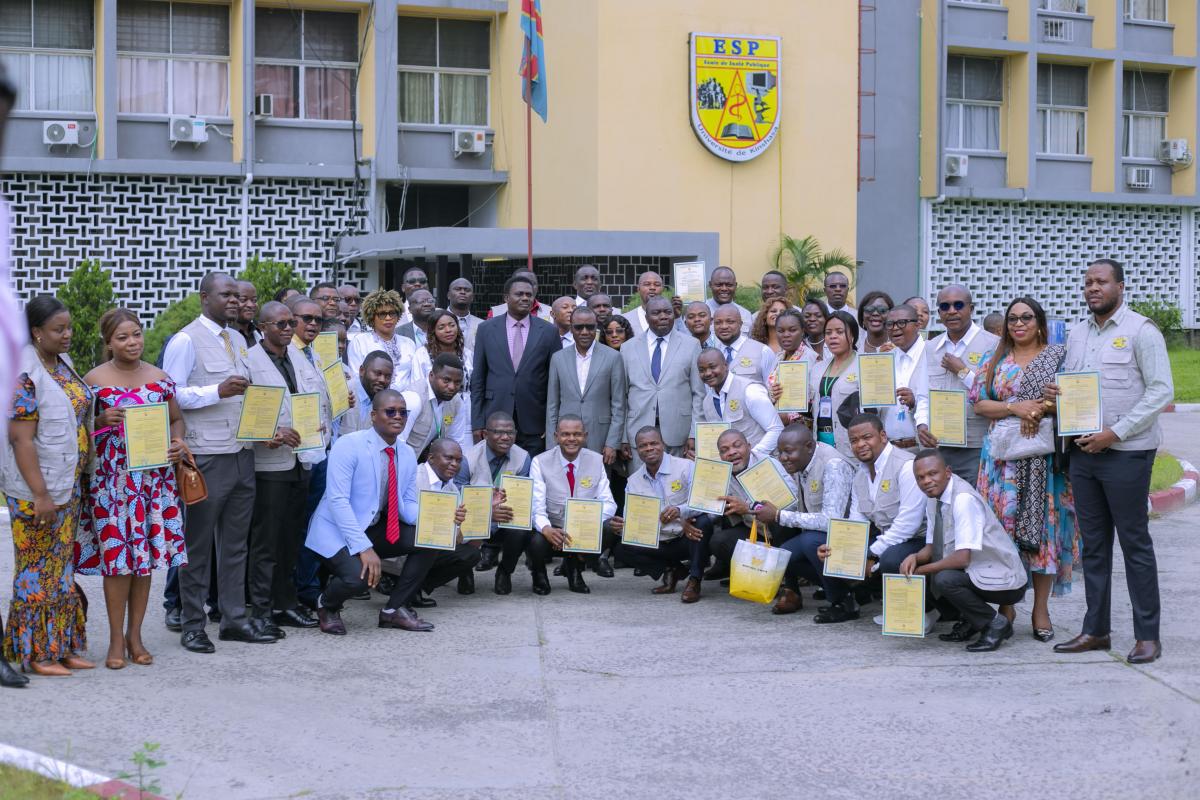
Accès aux soins de santé : la RDC forme ses médecins‑conseils
Paola VANGU TSAKALA | 09/01/2026
Une étape clé pour la mise en œuvre de la Couverture santé universelle en RDCLa remise des certificats aux médecins conseils formés marque officiellement leur entrée en fonction, désormais mieux outillés pour soutenir la mise en œuvre de la couverture santé universelle (CSU). Leur engagement sur le terrain devra se traduire par une amélioration tangible de l’accès, de la qualité et de l’équité des soins pour la population congolaise. La cérémonie de clôture de la formation, organisée le 12 décembre par le ministère de la Santé publique, Hygiène et Prévoyance sociale, en collaboration avec l’École de Santé publique (ESP) de l’Université de Kinshasa et avec l’appui financier d’Enabel, visait à doter ces médecins conseils des compétences indispensables à l’application effective de la CSU. Les médecins conseils au cœur de la réforme du système de santéActeurs centraux de cette réforme structurelle, les médecins conseils jouent un rôle clé dans la garantie de la qualité des soins, la protection financière des populations et la régulation des dépenses de santé. Cette initiative répond à la nécessité de disposer de cadres qualifiés capables d’accompagner le déploiement de l’assurance maladie obligatoire et d’en assurer la viabilité. Elle constitue ainsi un levier majeur de la transformation du système sanitaire congolais.Un programme intensif pour des compétences opérationnellesPendant sept semaines, cinquante (50) médecins conseils ont suivi un programme intensif axé sur la qualité des soins et la protection sociale. Pour Emmanuel Lukombe, « cet événement marque une étape cruciale dans la formation des médecins conseils pour notre pays afin d’assurer la continuité de l’assurance maladie obligatoire avec un personnel qualifié. Nous sommes convaincus qu’après cette formation, ils auront un impact réel sur le terrain ». S’exprimant au nom des apprenants, le docteur Joseph Mukwege a salué la pertinence du dispositif : « Le programme de cette formation constitue l’un des piliers du développement d’une assurance maladie et d’une assurance santé nationale. Il vise à renforcer la régulation et l’efficience des dépenses de soins de santé dans le cadre de la couverture santé universelle ».
-

Former ensemble pour l’emploi en RDC : le secteur privé au cœur des solutions
Paola VANGU TSAKALA | 09/01/2026
Dans les provinces minières du Haut-Katanga et du Lualaba, où la demande en compétences qualifiées demeure élevée, la synergie entre entreprises privées, institutions de formation et pouvoirs publics constitue un levier essentiel pour l’employabilité et le développement économique local. C’est dans cette dynamique que la Fédération des Entreprises du Congo (FEC), en collaboration avec la Coordination Haut-Katanga & Lualaba, a organisé le 25 novembre 2025 à Lubumbashi une table ronde sur l’engagement du secteur privé. Cette rencontre visait à fédérer les différents acteurs autour d’une vision commune : co-construire des projets de formation et d’insertion professionnelle alignés sur les besoins réels du marché local. Cette initiative a également permis de présenter les stratégies déployées par Enabel pour renforcer les partenariats avec le secteur privé, ainsi que plusieurs exemples de collaborations gagnant-gagnant, illustrant l’impact positif d’une approche concertée sur la formation, l’emploi et la compétitivité des entreprises.
-
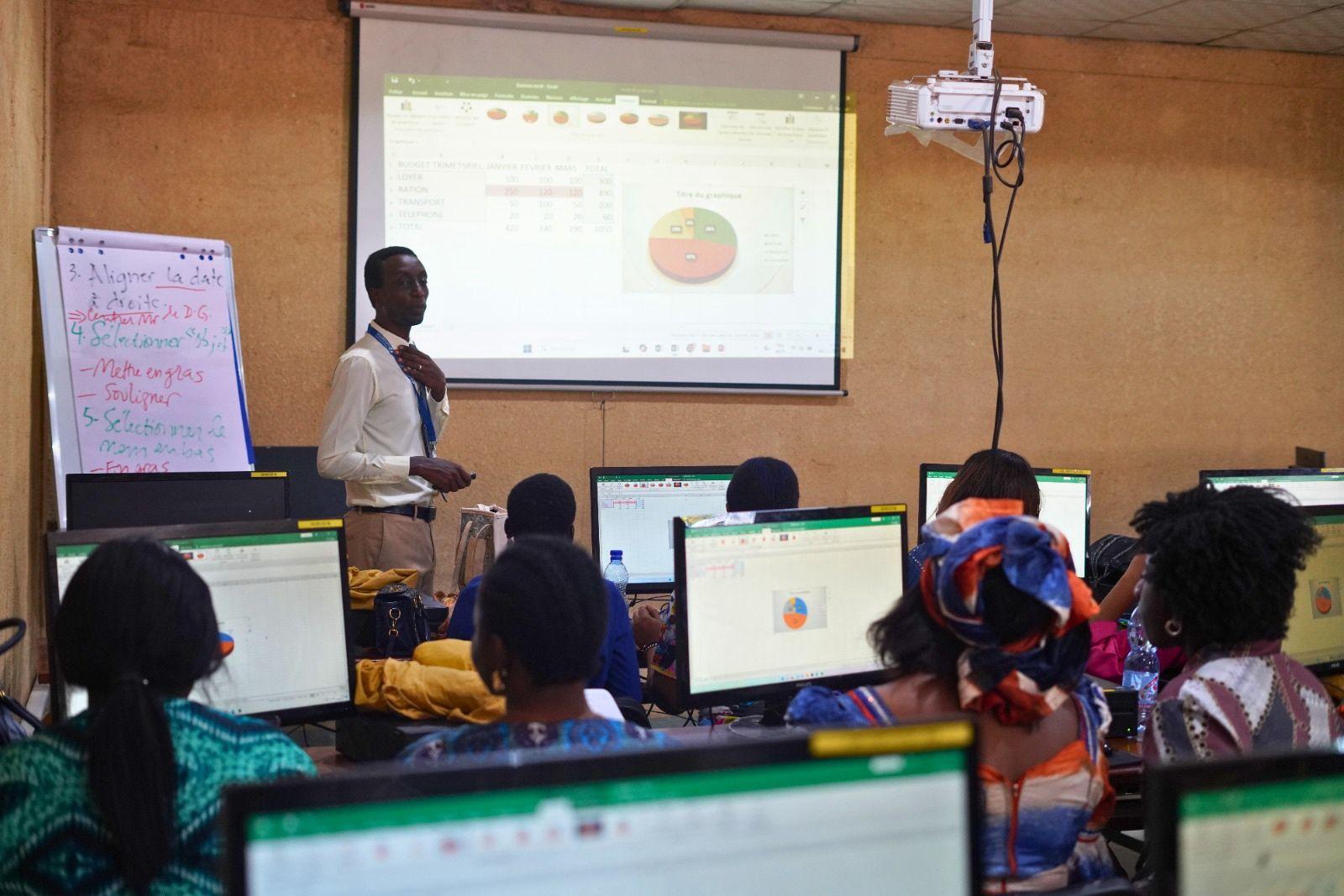
En RDC : accélérer l’inclusion numérique grâce à la stratégie D4D
Paola VANGU TSAKALA | 09/01/2026
La transformation digitale s’impose aujourd’hui comme un levier incontournable du développement. Pour y répondre, Enabel déploie sa nouvelle stratégie D4D – Digitalisation pour le Développement, visant à renforcer les compétences numériques de base des jeunes, des femmes, des enseignants et des techniciens. Au cœur de cette stratégie, le programme ICB (Informatics and Computer Basics), mis en œuvre en partenariat avec la STMicroelectronics Foundation, permet l’acquisition de compétences numériques essentielles, adaptées aux réalités locales et aux besoins du marché du travail. Former les formateurs pour un impact durableDu 20 au 28 novembre, une formation immersive s’est tenue au Centre de Ressources du Haut-Katanga, réunissant une dizaine de formateurs issus de différents centres appuyés par Enabel. Cette session a permis de renforcer à la fois leurs compétences techniques et pédagogiques, afin d’assurer une transmission efficace des modules ICB et Tablet for Kids auprès des apprenants.L’inclusion des femmes au cœur de la démarcheUn accent particulier a été mis sur l’autonomisation numérique des femmes, avec l’organisation d’une première formation dédiée à vingt apprenantes du projet Vroom Mama. Celles-ci ont été initiées à l’utilisation d’outils numériques appliqués à la conduite d’engins lourds, notamment les technologies embarquées telles que le GPS. Cette approche innovante vise à améliorer leur employabilité, à renforcer leur autonomie professionnelle et à favoriser leur insertion dans des secteurs traditionnellement masculins.Réduire la fracture numérique pour un développement inclusifLa réduction de la fracture numérique demeure un enjeu majeur pour faciliter l’accès à l’emploi et accompagner les jeunes et les femmes vers des opportunités professionnelles durables. À travers la stratégie D4D, Enabel réaffirme son engagement en faveur d’un développement inclusif, où le numérique devient un véritable moteur d’égalité des chances.
-
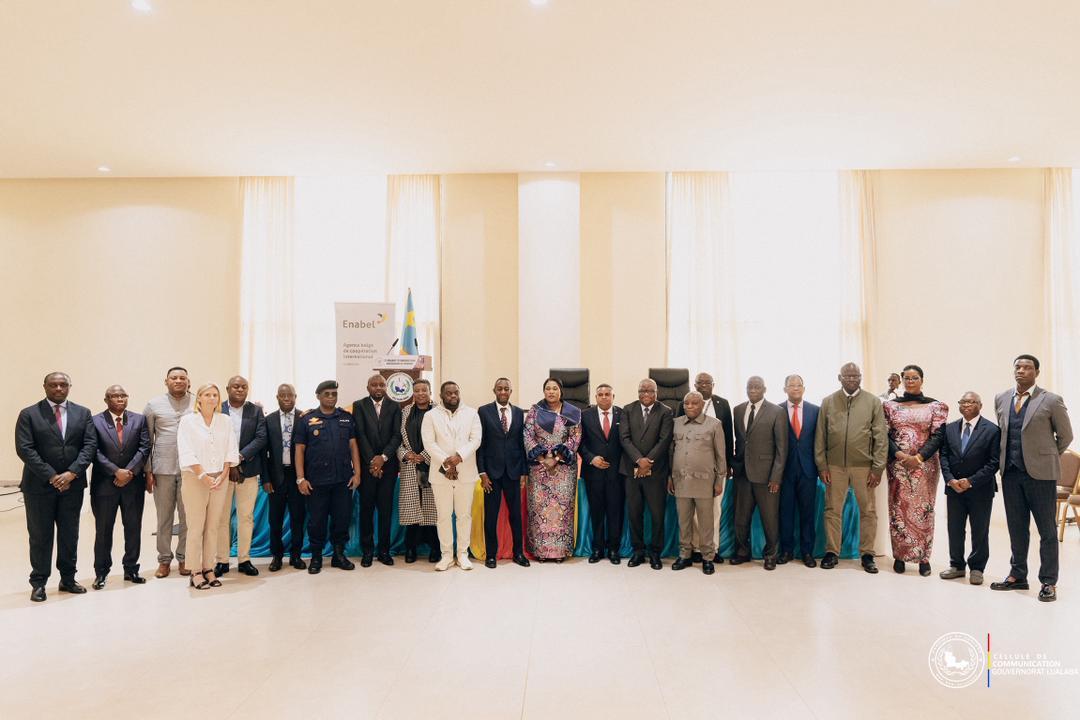
Gouvernance locale : la RDC mise sur les compétences publiques
Paola VANGU TSAKALA | 09/01/2026
Du 10 au 19 novembre 2025, près de 70 cadres issus du Gouvernement provincial, de l’Assemblée provinciale ainsi que des services techniques déconcentrés ont pris part à une session de formation dédiée au renforcement des capacités de l’administration publique dans la province du Lualaba (*). Animée par deux experts du cabinet I&D (Institutions et Développement) et du CEDA (Centre d’Études et de Gestion du Développement en Afrique), cette initiative, lancée par la Gouverneure Fifi Masuka, a été organisée par le Gouvernorat du Lualaba avec l’appui du projet d’Appui Institutionnel au niveau provincial.Cette formation visait principalement à outiller les participants sur les principes fondamentaux de la décentralisation, les bases de la bonne gouvernance, ainsi que les valeurs d’éthique et de déontologie dans la gestion des affaires publiques. À travers ce renforcement des compétences, la province du Lualaba pourra s’appuyer sur une administration plus performante et plus professionnelle, capable de conduire efficacement l’action publique dans le respect des cadres normatifs et légaux, conformément à la loi du 31 juillet 2008 (Loi n°08/012) relative à la libre administration des provinces.À noter que cette session s’inscrit dans une dynamique plus large de renforcement institutionnel, faisant suite à une formation similaire organisée du 27 octobre au 5 novembre 2025 à l’intention des cadres de la province du Haut-Katanga.(*) La province du Lualaba est une subdivision située au sud de la république démocratique du Congo. Elle est issue du démembrement de l'ancienne province du Katanga effectivement intervenu en 2015. Elle a pour chef-lieu Kolwezi.
-

RDC : des coopératives pour l’autonomie des maraîchères au Haut‑Katanga
Paola VANGU TSAKALA | 09/01/2026
L’Économie Sociale et Solidaire au service de l’autonomisation des femmes maraîchères du Haut-Katanga: valoriser le rôle des femmes à travers un modèle économique inclusifLe Haut-Katanga est depuis 2015 une province de la république démocratique du Congo à la suite de l'éclatement de la province du Katanga 1. Il se situe au sud-est du pays, à la frontière avec la Zambie.En reconnaissance du rôle essentiel que jouent les femmes dans le tissu socio-économique et culturel du Haut-Katanga, une initiative structurante a été mise en œuvre afin de renforcer leur autonomisation : la promotion de l’Économie Sociale et Solidaire (ESS). Cette approche place l’humain au cœur des dynamiques économiques et constitue un levier pertinent pour améliorer durablement les conditions de vie des femmes actives dans les secteurs informels.Renforcer les compétences pour un emploi décent et durable Pendant plus d’un mois, 75 femmes maraîchères ont bénéficié d’une formation complète axée sur l’entrepreneuriat et les techniques de maraîchage. Cette formation visait un double objectif : renforcer l’employabilité des femmes et des jeunes œuvrant dans l’économie informelle, et les accompagner vers des opportunités d’emploi décent à travers des modèles économiques inclusifs et durables. Les participantes ont été sensibilisées aux principes fondamentaux de l’ESS, notamment la primauté de l’humain sur le capital, la solidarité, la coopération, la gouvernance démocratique, la lucrativité modérée, l’ancrage territorial et la poursuite de l’intérêt général. Des projets collectifs porteurs de changement Organisées en équipes, les bénéficiaires ont eu l’opportunité de mettre en pratique les connaissances acquises en élaborant et en présentant des projets économiques collectifs. Ces initiatives, fondées sur les valeurs de l’ESS, traduisent la volonté des participantes de s’engager dans des activités génératrices de revenus structurées, solidaires et durables. À l’issue du processus, les meilleures propositions seront rigoureusement sélectionnées et bénéficieront d’un financement, garantissant ainsi le passage de la formation à l’action concrète sur le terrain. Un partenariat au service du développement local Cette initiative s’inscrit dans le cadre d’un accord de collaboration entre Enabel et le Centre de Ressources (CDR) du Haut-Katanga. À travers ce partenariat, les deux institutions réaffirment leur engagement en faveur de l’autonomisation économique des femmes, du développement local inclusif et de la promotion de modèles économiques alternatifs capables de répondre aux défis sociaux et économiques de la province.
-
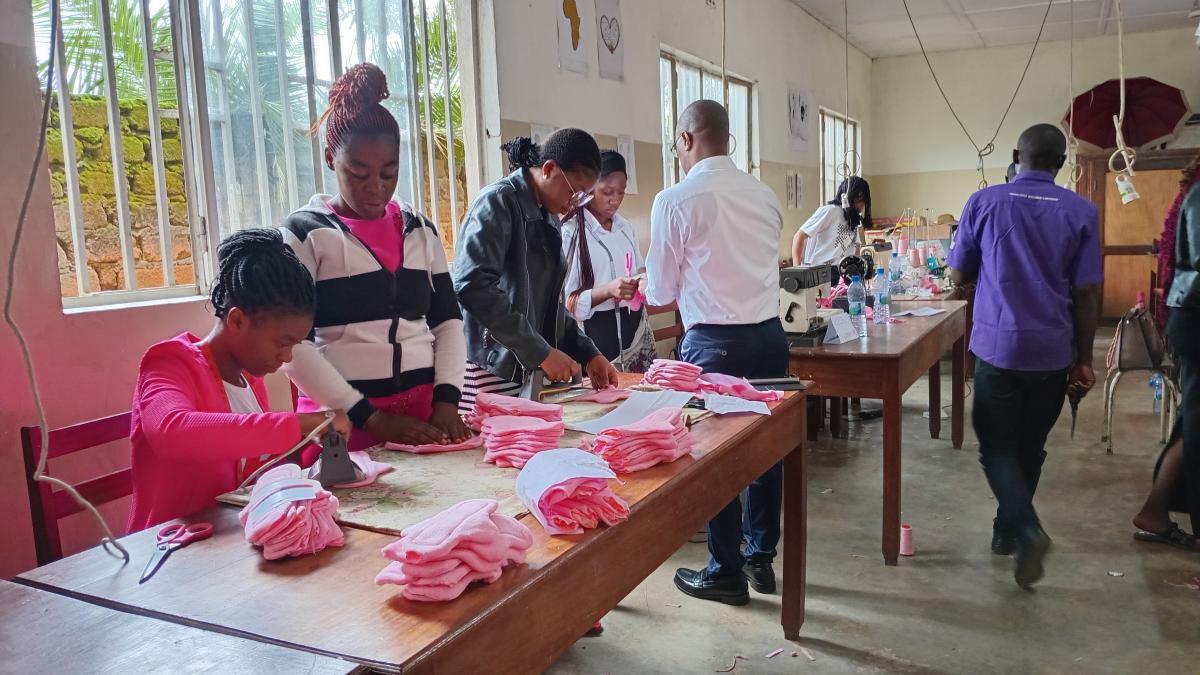
Vers une santé menstruelle digne en RDC : l’impact de la formation
Paola VANGU TSAKALA | 09/01/2026
Santé menstruelle durable en RDC : la formation comme levier de dignité et d’autonomisationDu 17 au 28 novembre 2025, les provinces éducationnelles Haut-Katanga 1 et 2 ont organisé une formation de 12 jours à l’intention de 16 artisans, dont 15 femmes et un homme, originaires de Likasi, Kambove, Kasenga et Lubumbashi. Le Haut-Katanga est depuis 2015 une province de la république démocratique du Congo à la suite de l'éclatement de la province du Katanga 1. Il se situe au sud-est du pays, à la frontière avec la Zambie (botte du Katanga).Cette session de renforcement des capacités a porté sur des thématiques essentielles, notamment la santé menstruelle et l’hygiène intime durable, les techniques de confection de serviettes hygiéniques lavables, ainsi qu’une initiation à l’entrepreneuriat, afin de favoriser l’autonomie économique des participants. À l’issue de la formation, 1.600 serviettes hygiéniques lavables et réutilisables ont été confectionnées. Cette initiative vise à offrir une solution durable et accessible pour améliorer la santé menstruelle au sein des communautés, en facilitant l’accès à des produits hygiéniques abordables, écologiques et réutilisables pour les filles et les femmes. Au-delà de l’impact sanitaire, cette action contribue également à la création d’opportunités économiques pour les artisans formés, en renforçant leurs compétences techniques et entrepreneuriales. « Lorsque nous avons entamé cette formation, la plupart d’entre nous ignoraient les techniques de confection de serviettes hygiéniques lavables. Aujourd’hui, nous maîtrisons un savoir-faire essentiel et disposons d’une solution concrète pour améliorer les conditions de vie de nombreuses femmes et jeunes filles. Nous repartons non seulement avec les serviettes produites, mais surtout avec la fierté de fabriquer un produit utile, écologique et qui redonne de la dignité »,Nday Mwenze Laurianne, apprenante et artisane à Lubumbashi. La clôture de la formation a été marquée par la remise d'attestations de participation et de kits de démarrage aux artisans, afin de les soutenir dans le lancement de leurs activités. Une remise symbolique de kits hygiéniques aux élèves du lycée Wema a également été effectuée, témoignant d'un engagement ferme en faveur de la dignité et du bien-être de toutes.
-
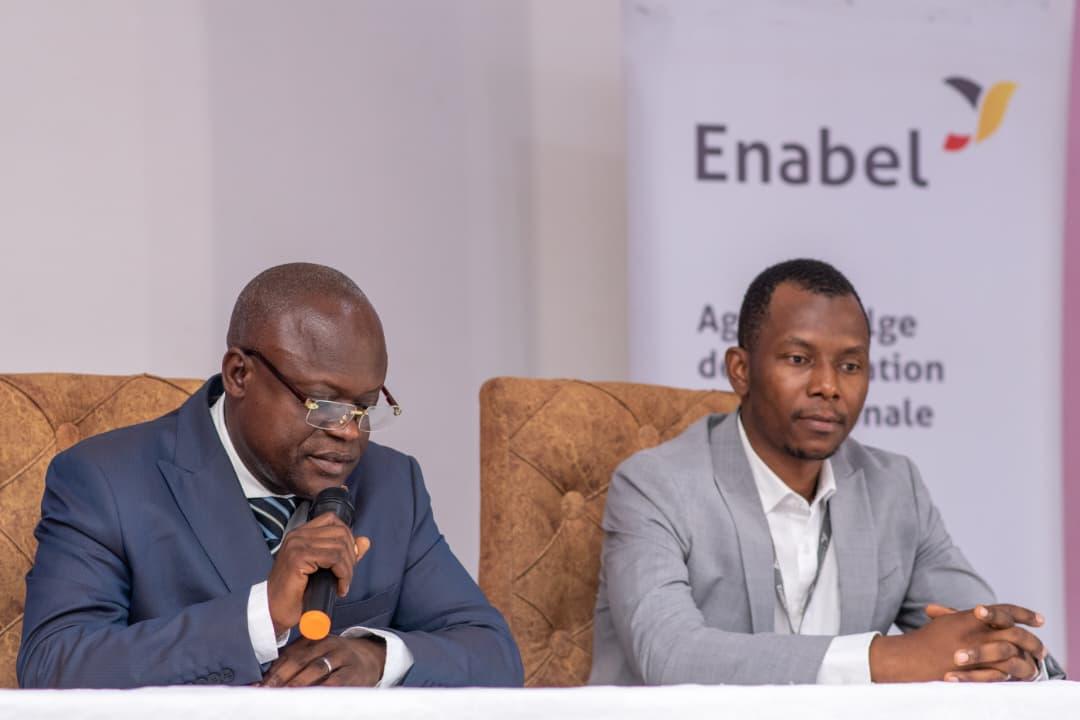
RDC : former les moto‑taxis, sécuriser la mobilité urbaine
Paola VANGU TSAKALA | 08/01/2026
À Lubumbashi , les moto-taxis jouent un rôle essentiel dans le désenclavement des quartiers difficiles d'accès et constituent une alternative rapide face à la saturation des transports urbains. Toutefois, la méconnaissance du code de la route par certains conducteurs demeure une source majeure d' insécurité routière pour les usagers. Afin de renforcer les compétences des conducteurs et de promouvoir un travail décent dans un secteur largement informel , plus de 80 moto-taximens , issus de différentes associations de la ville, ont suivi une formation d'un mois , clôturée début novembre à l' Institut National de Préparation Professionnelle (INPP) , partenaire de cette initiative. Le programme de formation, spécialement conçu pour répondre aux réalités du secteur, a couvert plusieurs thématiques clés, notamment (1) le code de la route et la réglementation routière, (2) l' entretien des motos et les notions de mécanique de base , (3) la prise en charge des clients ainsi que (4) les bases de la gestion financière . En renforçant la professionnalisation des moto-taxis, cette initiative contribue à l'amélioration durable de la sécurité routière , à la qualité des services offerts aux usagers et à la valorisation des métiers de la mobilité urbaine à Lubumbashi.
-
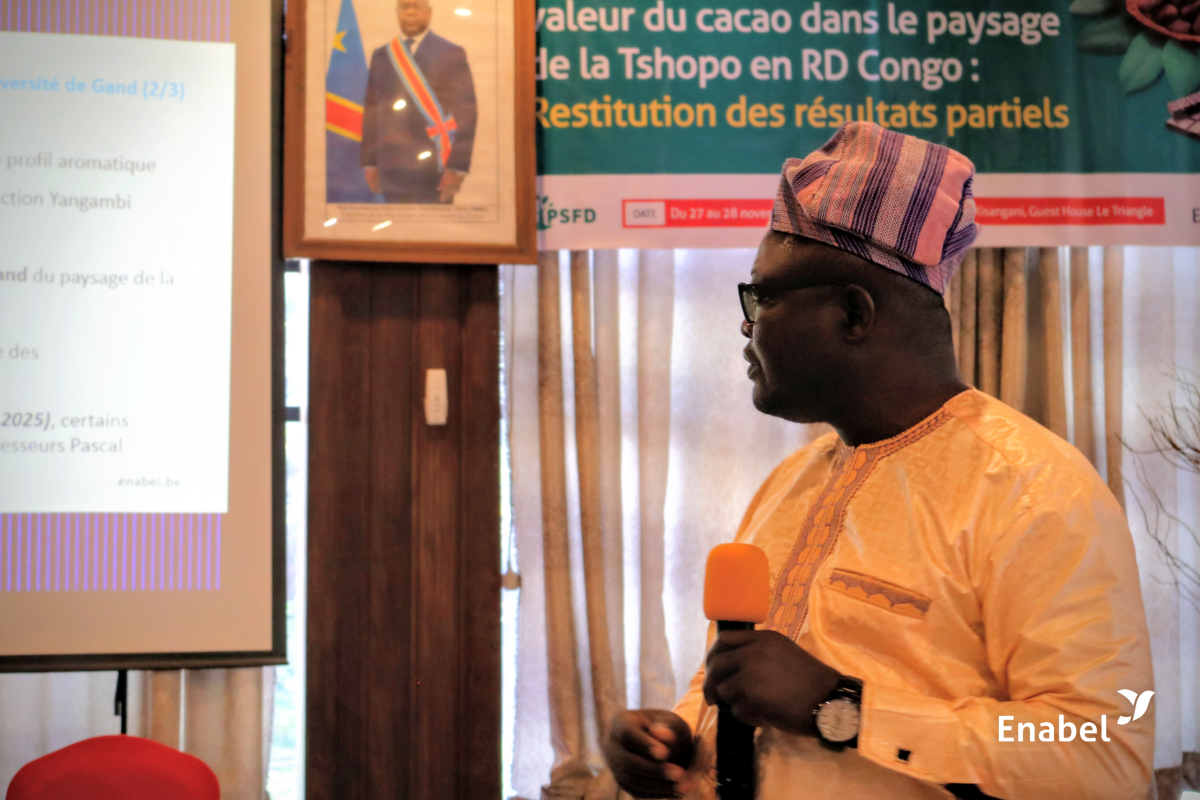
En RDC : La recherche au service d’un cacao d'excellence à la Tshopo
Paola VANGU TSAKALA | 08/01/2026
Lors de la séance de restitution des premiers résultats, tenue du 27 au 28 novembre , le professeur Koen Dewettinck , expert en transformation du cacao, a mis en lumière la complexité du processus de fabrication d'un chocolat de qualité . Celui-ci repose sur une chaîne rigoureuse allant de la sélection des variétés à la fermentation , au séchage , à la torréfaction , au concassage et enfin au tempérage . L'expert a insisté sur l'importance cruciale du contrôle de la fermentation , étape déterminante dans la formation des arômes, tout en alertant sur les pertes de qualité liées à un séchage mal maîtrisé . Selon lui, la transformation locale du cacao constitue un levier stratégique pour créer davantage de valeur ajoutée et d'emplois en République Démocratique du Congo. « Il n'y a pas de chocolat belge sans cacao de qualité provenant des pays producteurs. Aujourd'hui, avec un prix atteignant 6 000 euros la tonne , la RDC dispose d'une opportunité unique qu'elle doit impérativement saisir », a-t-il souligné.Des résultats prometteurs pour un cacao de fine saveurLa dégustation des variétés issues des parcelles expérimentales de la Tshopo (*) a révélé des profils aromatiques fruités, floraux et légèrement boisés , caractéristiques des fins cacaos. Ces résultats partiels confirment le fort potentiel de la région à produire un cacao de haute qualité, à condition de (1) renforcer la formation des producteurs, (2) structurer durablement les organisations paysannes et (3) améliorer l' accès aux marchés. Une collaboration scientifique pour repositionner la TshopoDepuis novembre 2023 , Enabel collabore avec l'Université de Gand afin de renforcer l'ensemble de la chaîne de valeur du cacao dans le paysage de la Tshopo . Cette coopération scientifique vise à repositionner la province comme une région productrice de cacao de fine saveur , capable de se distinguer sur le marché international. À travers la science, la recherche et l'innovation , cette dynamique ouvre la voie à une Tshopo reconnue comme pôle de référence en cacao de qualité et en transformation chocolatière compétitive , au bénéfice des producteurs, de l'économie locale et du développement durable.(*) La Tshopo est une province de la République Démocratique du Congo, issue du démembrement de l'ancienne Province Orientale. Son chef-lieu est Kisangani.
